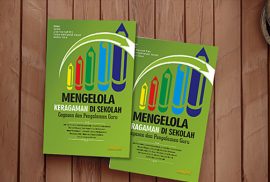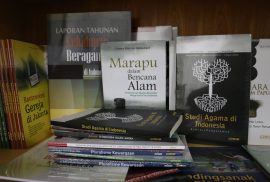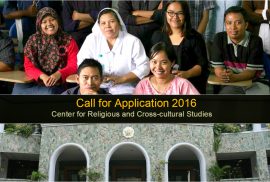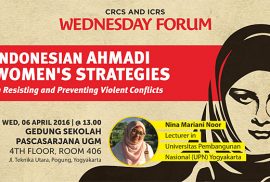Ribka Ninaris Barus | CRCS | Book Review
 Keberagaman merupakan salah satu konteks kehidupan masyarakat Indonesia yang telah disadari sejak awal berdirinya republik ini, sehingga semboyan “Bhineka Tunggal Ika” dijadikan menjadi salah satu falsafah hidup Bangsa Indonesia. Terjadinya konflik-konflik yang berkaitan dengan keberagaman, baik agama dan etnitsitas, memunculkan keresahan sehingga masyarakat tidak merasakan kehidupan aman dan damai. Hal ini dapat dilihat sebagai indikator kurangnya kesadaran dan/atau pemahaman masyarakat akan arti keberagaman. Berkaitan dengan hal tersebut, sekolah merupakan salah satu ruang yang dianggap penting untuk mengakomodir pengetahuan dan pemahaman keberagaman. Sekolah tidak hanya dimaknai sebagai ruang untuk memperoleh pengetahuan untuk mengukur kemampuan kognitif dan prestasi akademis, melainkan sebagai ruang untuk memeroleh nilai-nilai kehidupan bermasyarakat, berbangsa, dan bernegara secara kontekstual.
Keberagaman merupakan salah satu konteks kehidupan masyarakat Indonesia yang telah disadari sejak awal berdirinya republik ini, sehingga semboyan “Bhineka Tunggal Ika” dijadikan menjadi salah satu falsafah hidup Bangsa Indonesia. Terjadinya konflik-konflik yang berkaitan dengan keberagaman, baik agama dan etnitsitas, memunculkan keresahan sehingga masyarakat tidak merasakan kehidupan aman dan damai. Hal ini dapat dilihat sebagai indikator kurangnya kesadaran dan/atau pemahaman masyarakat akan arti keberagaman. Berkaitan dengan hal tersebut, sekolah merupakan salah satu ruang yang dianggap penting untuk mengakomodir pengetahuan dan pemahaman keberagaman. Sekolah tidak hanya dimaknai sebagai ruang untuk memperoleh pengetahuan untuk mengukur kemampuan kognitif dan prestasi akademis, melainkan sebagai ruang untuk memeroleh nilai-nilai kehidupan bermasyarakat, berbangsa, dan bernegara secara kontekstual.
Buku berjudul “Mengelola Keragaman di Sekolah” yang diterbitkan oleh CRCS pada Februari 2016, merupakan salah satu buku yang berkaitan dengan pengelolaan keberagaman di Indonesia, khususnya di sekolah. Buku ini memuat tiga belas artikel yang ditulis oleh para guru yang berasal dari beberapa sekolah di Daerah Istimewa Yogyakarta dan Kabupaten Magelang, Jawa Tengah, melalui Kompetisi Esai Guru yang diselenggarakan oleh penerbit. Ide dalam artikel-artikel tersebut berdasarkan pada pengalaman proses belajar-mengajar yang dialami langsung oleh para penulis.
Secara holistik, keberagaman yang ditampilkan dan dibahas dalam buku ini tidak terbatas pada agama, etnis, budaya/adat-istiadat, bahasa, gender dan status sosial. Keberagaman dalam pengertian yang lebih luas mencangkup keberagaman kecerdasan naradidik, yang dibahas oleh Sangidah Rofiah dalam artikel berjudul “Pembelajaran Berbasis Keragaman Kecerdasan dengan Pendekatan Neuro Linguistik Programming (NLP) pada Mata Pelajaran PAI”, sampai pada keberagaman respon dan metode mengajar yang diterapkan oleh para pendidik. Dengan demikian, buku ini menyediakan pemahaman yang lebih luas pada makna keberagaman itu sendiri.
Buku ini menunjukkan potret pengelolaan keragaman melaui pendidikan formal yang dilaksanakan di sekolah negeri dan swasta baik yang berbasis agama dan bersifat homogen, maupun sekolah inklusi. Ada beberapa sekolah yang secara institusional sudah menerapkan kurikulum dan metode pengelolaan keragaman dalam proses belajar mengajar untuk membangun toleransi peserta didik, seperti yang diterapkan di Sekolah Negeri Satu Muntilan, Sekolah Tumbuh Yogyakarta, dan Yayasan Budi Mulia Yogyakarta. Sementara itu, beberapa penulis masih berupaya mengelola keragaman melalui mata pelajaran yang diampu dengan menerapkan metode pengajaran yang kreatif. Pentingnya pengelolaan keragaman dalam konteks Indonesia dan peran sekolah dalam upaya tersebut diutarakan oleh semua penulis dalam buku ini, meski sebagian menyampaikan secara implisit.
Pengelolaan keragaman dalam lingkup sekolah bukan sesuatu yang mudah dilakukan, dimana hal tersebut menuntut kesadaran banyak pihak, mulai dari naradidik, pendidik, dan para pemangku kepentingan di sekolah. Metode-metode yang telah diterapkan oleh para penulis, seperti debat, fieldtrip, diskusi kelompok, menempatkan naradidik sebagai subjek aktif dalam proses belajar-mengajar dalam upaya menggali nilai-nilai keragaman. Upaya yang demikian diharapkan dapat memperdalam pemahaman naradidik tentang keberagaman yang tidak terfokus hanya pada ranah kognitif dan bersifat normatif, tetapi juga pada ranah afektif dan praksis. Dengan demikian, pemahaman akan makna kebhinakaan diwujudkan dalam hidup yang toleran dan damai. Peran para pendidik dan pemangku kepentingan juga sangat penting dalam upaya pengelolaan keragaman. Wawasan pengetahuan dan kreatifitas para guru serta kebijakan dan peraturan yang ditetapkan oleh stakeholders memiliki peran yang sangat penting dalam upaya tersebut. Imam Mutakhim secara khusus memaparkan hal tersebut dalam artikelnya di bagian akhir buku ini. Mutakhim berpendapat bahwa seluruh unsur meliputi guru, kepala sekolah, karyawan, dll., merupakan elemen yang saling terkait dan penting dalam mengelola keragaman di sekolah (p.178). Jika salah satu pihak bersifat pasif maka kemungkinan hal tersebut sulit terlaksana.
Book Title: Mengelola Keragaman di Sekolah, Gagasan dan Pengalaman Guru | Author: Anis Farikhatin, Arifah Suryaningsih, Dani Bilkis Saida Aminah, dkk | Pubhlisher: CRCS UGM | Year: Februari 2016 | Paperback: xi + 96 pages | ISBN: 978-602-72686-5-4
Download books here
CRCS-UGM

Sembilan mahasiswa CRCS dari dua angkatan yang berbeda berhasil memeroleh gelar Master of Art dari Program Studi Agama dan Lintas Budaya pada prosesi wisuda Pascasarjana Universitas Gadjah Mada, Selasa, 19 April 2016. Sebagian besar dari mereka mendapatkan penghargaan sebagai wisudawati-wisudawan berprestasi dengan predikat cum laude. Tema thesis mereka pun cukup beragam mulai dari etika, budaya lokal, kesehatan, media online, humanitarian, tato, aliran kepercayaan, lingkungan hingga gerakan keagamaan. Berikut nama-nama dan karya thesis mereka:

Center for Religious and Cross-cultural Studies (CRCS), Graduate School, Gadjah Mada University proudly announces the call for Thesis Award. The Award is aimed to encourage CRCS students of batch 2015 to write a high quality of master thesis and a publishable article out the thesis on “Religious Education in Higher Education.”
The requirements of the Thesis Award are:
Aziz Anwar Fachrudin | CRCS | Article
 Among the challenges Muslims face when they are engaged in the recently overwhelming debate on whether Islam is a religion of violence/peace is the fact that the Quran contains many verses which, at least when seen at a glance, promote violence. Indeed, there are verses in the Quran that even encourage fighting and killing, addressed to those considered unbelievers/infidels (kuffar) and/or polytheists (mushrikin); and when they are read and interpreted literally, they can be seen as preaching hatred toward non-Muslims. Moreover, some of those verses have been picked by the Islamic State (of Iraq and al-Sham, or ISIS) to justify its atrocities toward those having different beliefs. On the other hand, those “violent verses” are often cited by many involved in the debate, particularly by Islamophobias in the West, to discredit Islam and to show that Islam is a religion of violence, instead of peace.
Among the challenges Muslims face when they are engaged in the recently overwhelming debate on whether Islam is a religion of violence/peace is the fact that the Quran contains many verses which, at least when seen at a glance, promote violence. Indeed, there are verses in the Quran that even encourage fighting and killing, addressed to those considered unbelievers/infidels (kuffar) and/or polytheists (mushrikin); and when they are read and interpreted literally, they can be seen as preaching hatred toward non-Muslims. Moreover, some of those verses have been picked by the Islamic State (of Iraq and al-Sham, or ISIS) to justify its atrocities toward those having different beliefs. On the other hand, those “violent verses” are often cited by many involved in the debate, particularly by Islamophobias in the West, to discredit Islam and to show that Islam is a religion of violence, instead of peace.
This paper is going to examine those “violent verses’; not all, but some of them that have similar redaction. That is, those verses which read, more or less, “kill them wherever you find them”. There are three verses which are like that: (1) QS. al-Baqarah [2]:191; (2) QS. al-Nisa’ [4]:89; and (3) QS. al-Tawbah [9]:5. It is to examine both the classical and the modern interpretations of those three verses. By classical interpretations I mean the interpretations and commentaries of those verses as in classical books of tafsir written by medieval, pre-modern Muslim scholars of exegesis, to which very often many Muslims today still refer. By modern interpretations I mean the interpretations and commentaries that are written by modern Muslim exegetes. Along this line of elaboration, I shall compare both in order to know to what extent there has been a change in interpretations of the abovementioned verses.
This paper shall therefore be intended to convey three things. First is to show both classical and modern interpretations of those verses. Second is to point out what we will get when we compare those two types of interpretations and how the verses have been interpreted differently. Third, this paper shall be finished by some hermeneutical reflections resulting from the examination of both the classical and the modern interpretations. As for the classical interpretations, the books of tafsir that shall be mostly referred to in this paper are that of al-Tabari (839-923), Al-Razi (1149-1209), al-Qurtubi (1214-1273), and Ibn Kathir (1301-1373). While for the modern interpretations, the books of tafsir that shall be referred to are that of Rashid Rida (1865-1935), al-Sha‘rawi (1911-1998), Al-Zuhayli (1932-2015), and Quraish Shihab (1944-…). All these books of tafsir contains exegeses that are elaborated in chronological, chapter-based way, or verse by verse conforming to the way the verses are serially organized in the Quran. (This way is technically known as al-tafsir al-tajzi‘i or tafsir based on chapters or partitions of the Quran, as compared to al-tafsir al-mawdu‘i or tafsir based on themes/topics.) In this paper, when I mention a name of a mufassir (exegete) of them, it means I refer to his interpretations/commentaries that come after the verse being discussed. Read more in religio.uinsby.ac.id
*Aziz Anwar Fachrudin is CRCS Student batch 2014
Applications for admission to the Center for Religious and Cross-cultural Studies (CRCS) for the 2016/2017 academic year are now being accepted. For more information click Admission 2016 and information on scholarship click Scholarship

Abstract
The Indonesian Ahmadiyya community has been facing violent conflicts after the Reformasi era. This dissertation focuses on the narrative of Ahmadi women about their experiences in dealing with daily conflicts they face in relation to their faith. This paper focuses on the acts of the Ahmadi women organization called Lajnah Imaillah from 2000 to early 2015 by examining their defense mechanism and exercising agency in resisting and preventing conflicts. The study was conducted in four areas in Indonesia, Kuningan in West Java, Yogyakarta, Lombok in West Nusa Tenggara and Head Office of Lajnah Imaillah in Bogor. The informants were Ahmadi women from different socio economics status and positions in the organization. Using narrative inquiry, this research found out that in responding and resisting to violent conflicts, Lajnah Imaillah has been changing its way of resistance and its forms of defense mechanism. The conflicts that Ahmadi women face have encouraged them organizationally and individually to be more actively participate in wider society and build good relationships with the religious others outside of the community. Therefore this paper argues that non-violent defense mechanism promotes better relations and mutual understanding among conflicting parties in society.
Speaker
 Nina Mariani Noor just earned her Ph.D from Inter Religious Studies, ICRS (Indonesian Consortium For Religious Studies) Universitas Gadjah Mada last January. Her concern is on conflict resolution, gender, and minority studies. Nina is Programme Executive Globethics.net Indonesia (www.globethics.net) . Globethics.net is the biggest, global online platform dedicated to promote inclusive, values-driven transformation for sustainable living, through access to knowledge, networking, collaborative research, training and events. She also teaches in Universitas Pembangunan Nasional (UPN) Yogyakarta this semester.
Nina Mariani Noor just earned her Ph.D from Inter Religious Studies, ICRS (Indonesian Consortium For Religious Studies) Universitas Gadjah Mada last January. Her concern is on conflict resolution, gender, and minority studies. Nina is Programme Executive Globethics.net Indonesia (www.globethics.net) . Globethics.net is the biggest, global online platform dedicated to promote inclusive, values-driven transformation for sustainable living, through access to knowledge, networking, collaborative research, training and events. She also teaches in Universitas Pembangunan Nasional (UPN) Yogyakarta this semester.







